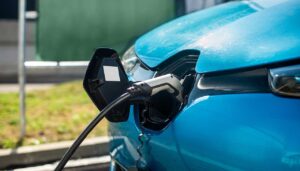The Advantages of Electric Vehicles Over Traditional Cars
5 min read
Woman charging her electric car with charging pistol
In recent years, electric vehicles (EVs) have surged in popularity, marking a significant shift in the automotive industry’s landscape. This transition from traditional gas-powered cars to electrically operated ones is fueled by a growing awareness of environmental issues and the advancement of technology. Electric vehicles offer a plethora of advantages over their gasoline counterparts, ranging from environmental benefits to cost savings and superior performance. This document explores these advantages, shedding light on why electric vehicles are considered by many to be the future of transportation.
Environmental Benefits
Electric vehicles play a critical role in reducing carbon emissions and air pollution, two pressing environmental challenges of our time. Unlike traditional cars that emit carbon dioxide and other pollutants, contributing significantly to air quality degradation and climate change, EVs produce zero tailpipe emissions. This dramatic reduction in air pollutants is vital for improving urban air quality and protecting public health. Additionally, the shift to electric vehicles decreases our dependence on fossil fuels, a non-renewable resource that is not only environmentally destructive in its extraction and use but also subject to volatile global markets. By transitioning to electric vehicles, which can be powered by renewable energy sources such as wind and solar, we make a substantial move towards a more sustainable and secure energy future.
Cost Savings
Electric vehicles offer significant cost savings over their gasoline-powered counterparts, a benefit that extends beyond the initial purchase price. Firstly, the cost of electricity required to power EVs is considerably lower than the price of gasoline, resulting in substantial savings on fuel over the vehicle’s lifetime. This difference is even more pronounced in regions where electricity is cheaper or during off-peak charging times. Secondly, electric vehicles boast fewer moving parts than traditional internal combustion engines. This simplicity translates to less wear and tear, reducing the frequency and cost of maintenance and repairs. Common expenses associated with gasoline vehicles, such as oil changes, are completely absent in electric vehicles, further lowering the overall cost of ownership.
Performance and Efficiency
Electric vehicles are not only beneficial for the environment and cost-effective in the long run, but they also offer superior performance and efficiency features that enhance the driving experience. One of the most notable advantages is the instant torque provided by electric motors, which enables quick acceleration right from a standstill, outperforming traditional gasoline engines in terms of responsiveness and speed. Additionally, EVs utilize regenerative braking, a system that captures energy lost during braking and converts it into electricity to recharge the battery. This innovative feature not only improves the overall efficiency of the vehicle but also extends its driving range, making electric vehicles both more powerful and more economical to operate.
Technological Advancements
The rapid advancement in battery technology has been a game-changer for electric vehicles, significantly enhancing their appeal by extending driving ranges to rival, and in some cases surpass, that of gasoline vehicles. Today’s EVs benefit from lithium-ion batteries that offer higher energy density, longer lifespans, and faster charging capabilities. These improvements mean that electric vehicles can now cover considerable distances on a single charge, alleviating range anxiety for prospective buyers. Furthermore, the integration of smart features in electric vehicles has transformed the user experience, making it more convenient, safer, and enjoyable. Features such as autonomous driving capabilities, real-time traffic and weather updates, remote diagnostics, and over-the-air software updates bring a level of sophistication and interactivity unmatched by traditional cars. This fusion of cutting-edge battery technology and smart features not only propels EVs to the forefront of automotive innovation but also aligns with consumer expectations for high-performance, connected, and environmentally friendly transportation options.
Government Incentives and Policies
To further boost the adoption of electric vehicles, governments worldwide have implemented various incentives and policies. Tax incentives and rebates are prominent tools used to reduce the financial burden on EV buyers, making electric vehicles more affordable and attractive compared to their gasoline-powered counterparts. These fiscal measures can significantly lower the upfront cost of purchasing an EV, with benefits including tax credits, reduced vehicle registration fees, and exemptions from sales taxes. Additionally, regulations on emissions are increasingly favoring electric vehicles, with many regions setting ambitious targets to phase out the sale of gasoline and diesel cars in the coming decades. Such policies not only underscore the commitment of governments to combat climate change but also signal a structural shift in the automotive industry towards more sustainable practices. By combining financial incentives with stringent environmental regulations, policymakers are providing a clear pathway for the accelerated growth of the electric vehicle market.
Infrastructure Development
The expansion of charging infrastructure is critical in supporting the widespread adoption of electric vehicles (EVs). Convenient access to charging facilities addresses one of the primary concerns potential EV buyers have: range anxiety. The development of fast-charging networks is a key element in this, as it significantly reduces the time needed to recharge an EV’s battery. Modern fast chargers can replenish a substantial portion of an EV’s battery capacity in just minutes, making long-distance travel feasible and comparable to the time spent refueling a traditional gasoline vehicle. This growth in charging infrastructure not only includes the increase in the number of public charging stations but also the strategic placement along major highways, in urban centers, and in residential communities to ensure that EV owners can find reliable charging options wherever they go. Governments and private companies alike are investing heavily in the expansion of fast-charging networks, recognizing that efficient and widespread charging infrastructure is essential for the transition to electric mobility.
Consumer Perception and Future Outlook
Consumer perception of sustainable transportation has undergone a significant transformation over the past decade. The once niche appeal of electric vehicles (EVs) has broadened, as awareness of environmental issues becomes increasingly mainstream, and consumers actively seek to reduce their carbon footprint. This shift is not only driven by an enhanced understanding of the impact of fossil fuels on climate change but also by the tangible benefits that EVs offer in terms of operational efficiency, lower maintenance costs, and technological advancements. Looking forward, the EV market is poised for unprecedented growth. Analysts predict that as battery technology continues to improve, costs will decrease, making EVs competitive with, if not more affordable than, traditional vehicles. Furthermore, continued innovations in EV technology are expected to increase driving range, reduce charging times, and introduce more sophisticated features, reinforcing the market’s shift towards electric mobility. With governments around the world setting ambitious targets for reducing greenhouse gas emissions and increasing the adoption of renewable energy sources, the future of the automotive industry is undoubtedly electric. This transition, supported by evolving consumer preferences and significant investments in EV infrastructure and technology, points to a future where electric vehicles become the standard, rather than the exception, in transportation.




